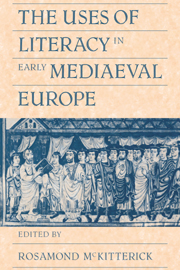Book contents
- Frontmatter
- Contents
- List of illustrations
- Contributors
- Preface
- Abbreviations
- Introduction
- 1 Literacy in Ireland: the evidence of the Patrick dossier in the Book of Armagh
- 2 Anglo-Saxon lay society and the written word
- 3 Administration, law and culture in Merovingian Gaul
- 4 Literacy and the papal government in late antiquity and the early middle ages
- 5 Literacy and the laity in early mediaeval Spain
- 6 Aspects of mediaeval Jewish literacy
- 7 Writing in early mediaeval Byzantium
- 8 Literacy displayed: the use of inscriptions at the monastery of San Vincenzo al Volturno in the early ninth century
- 9 Royal government and the written word in late Anglo-Saxon England
- 10 Literacy in Carolingian government
- 11 Text and image in the Carolingian world
- Conclusion
- Index
2 - Anglo-Saxon lay society and the written word
Published online by Cambridge University Press: 07 December 2009
- Frontmatter
- Contents
- List of illustrations
- Contributors
- Preface
- Abbreviations
- Introduction
- 1 Literacy in Ireland: the evidence of the Patrick dossier in the Book of Armagh
- 2 Anglo-Saxon lay society and the written word
- 3 Administration, law and culture in Merovingian Gaul
- 4 Literacy and the papal government in late antiquity and the early middle ages
- 5 Literacy and the laity in early mediaeval Spain
- 6 Aspects of mediaeval Jewish literacy
- 7 Writing in early mediaeval Byzantium
- 8 Literacy displayed: the use of inscriptions at the monastery of San Vincenzo al Volturno in the early ninth century
- 9 Royal government and the written word in late Anglo-Saxon England
- 10 Literacy in Carolingian government
- 11 Text and image in the Carolingian world
- Conclusion
- Index
Summary
The study of literacy in Anglo-Saxon England in some ways resembles the hunt for a certain elusive type of sub-atomic particle: the direct evidence for its existence is negligible but the fact that it does exist can be inferred from its perceived effect upon its environment. When we scour the primary sources for references to reading and writing, to the literacy of individuals, to basic education and book-ownership, our haul is sparse indeed. Inferences drawn from scribal competency can be suggestive, but hardly provide a sufficient basis for general analysis of the quality and extent of Anglo-Saxon literacy. The conclusions that derive from this type of material are plainly limited; they tend to reinforce the traditional view that literacy was essentially an ecclesiastical preserve, for it is impossible to demonstrate that the occasional indication to the contrary is anything more than an exception. Fortunately, the argument can be amplified by considering the problem from a rather different perspective and studying the ways in which the Anglo-Saxons utilized the written word and the extent to which writing superseded speech and memory as the standard method of conveying and storing information. This approach leads us to a rather different conclusion, for it seems to show that by the end of the period, if not several centuries before, written documentation had an important place in secular society and was used in ways which could imply a degree of literacy among certain sections of the laity.
Before we can assess the impact which literacy had on Anglo-Saxon society, it is necessary to try to establish a starting point for the investigation.
- Type
- Chapter
- Information
- The Uses of Literacy in Early Mediaeval Europe , pp. 36 - 62Publisher: Cambridge University PressPrint publication year: 1990
- 12
- Cited by



